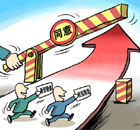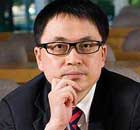-
-
China Daily E-paper
You Nuo
Educational pain for job seekers
By You Nuo (China Daily)
Updated: 2010-01-12 06:50
 |
Large Medium Small |
Nothing can better illustrate the failure of education in this country than the contrast between millions of college graduates finding it hard to get a proper job every year and the dearth of workers in the more industrialized regions.
According to news from Dongguan, one of the key manufacturing centers in the Pearl River Delta (PRD) region in South China, "over 90 percent" factories have said they are finding it difficult to recruit people from the second half of 2009, when the economy began picking up and overseas orders restarted pouring in. Running to full capacity seems a dream the factories had in the long past.
Since the country's demographic structure is no longer youthful - because of the one-child family policy practiced since the late 1970s - a shortage of workers could become a problem in all manufacturing cities on the country's coast.
An awkward reality is that only few, if any, of the new college graduates could really fill the vacancies because the trainings they have received are entirely different from the demands of the jobs. Nor will Chinese cities have enough manpower if they pursue a development model other than export-oriented manufacturing.
Indeed, Chinese colleges are being corrupted by a combination of a stubborn emphasis on the old bookish knowledge and the recent running-out-of-control experiment with self-financing. In fact, self-financing by colleges has become an exercise in greed as they keep collecting fees irrespective of the quality of education they impart.
The country is only beginning to feel the consequences of the education system in the southern manufacturing belt. In another couple of years, labor and social security authorities could be forced to design an expensive re-education program for the huge number of college graduates being churned out nowadays.
The reason for that is simple: The knowledge about management graduates gather is totally out of sync with reality, most of them can hardly express themselves in English or compose an email message properly, and cannot handle even clerical work in a law service with the legal knowledge they have.
I learned from some college teachers, who I went to college with, that the amount of time an average college student spends on studies today is less than half of what we spent in the late 1970s when proper college education was restored after the "cultural revolution" (1966-76).
"They (the administrations) have recruited so many students just to make money from their parents (tuition and other charges) that we (teachers) cannot even remember the names of all the students in a class," one of the teachers said embarrassedly. The teachers can in no way interfere with the process. "It's a nationwide phenomenon, you know."
It is hard to believe that a country could take education so casually when there are no longer as many young people as before and view its opportunities only in terms of immediate financial gains. Besides, vocational education faces a double threat: frequent fluctuation in the business cycle and that of a flooding of cheap college credentials.
It is surprising in a country famed for its reform and opening up, therefore, to see little reform and so much degradation in its education system. When colleges are reduced to money-making machines, they cannot help a society create enough workers, thinkers and leaders.
Now, as a new recruiting season draws near (after Spring Festival that starts on Feb 14), factory managers in the PRD region may be quite nervous, not knowing whether they can hire enough people to run their machines.
If that is the case, leaders of Guangdong province (the PRD region is part of it) are also to blame for having failed to provide the managers with due insurance in regional urban programs. They should have given greater rewards to industrial expertise that Guangdong can attract - enough to let it flourish in its manufacturing cities to make up for the inadequacies in the national education system.
E-mail: younuo@chinadaily.com.cn









